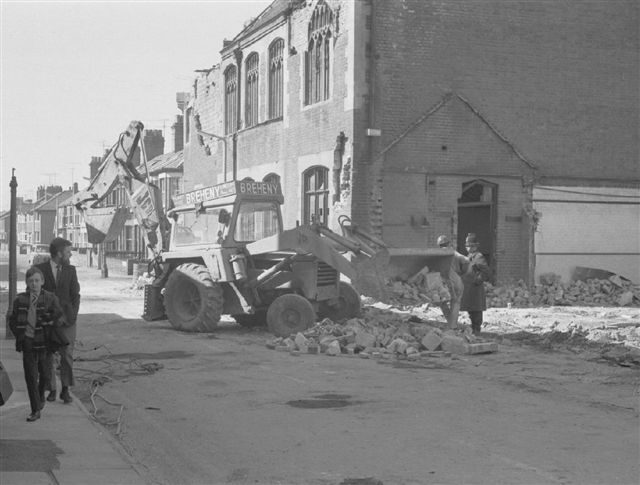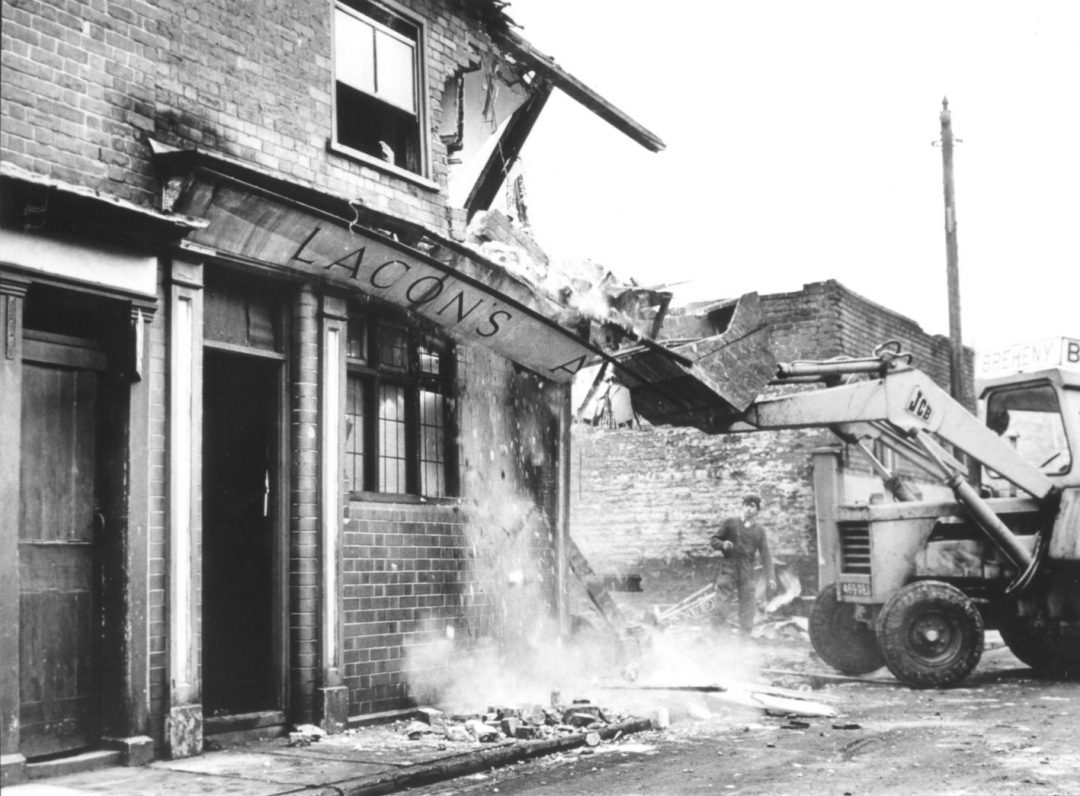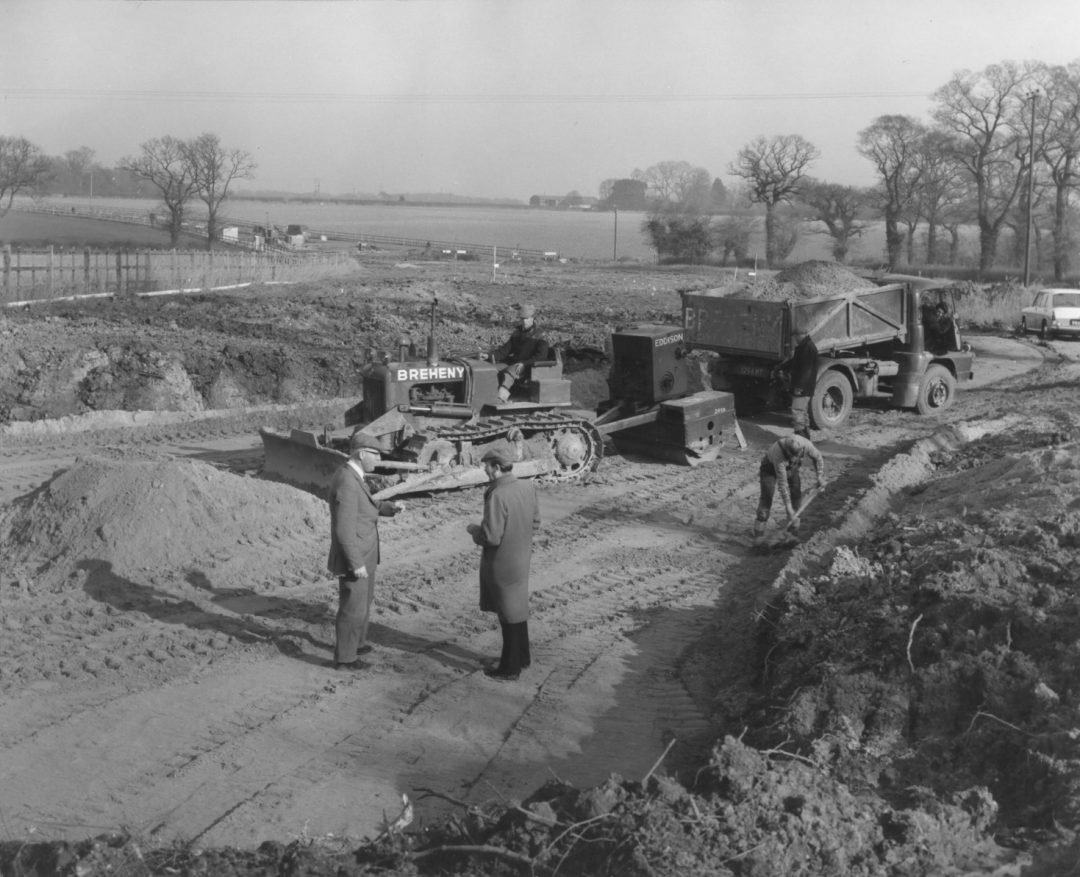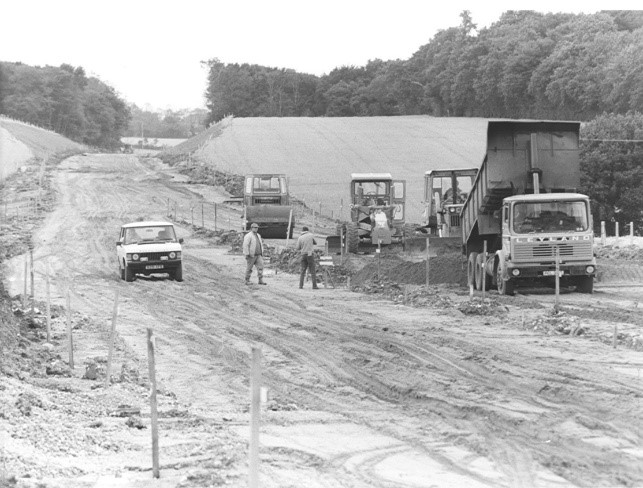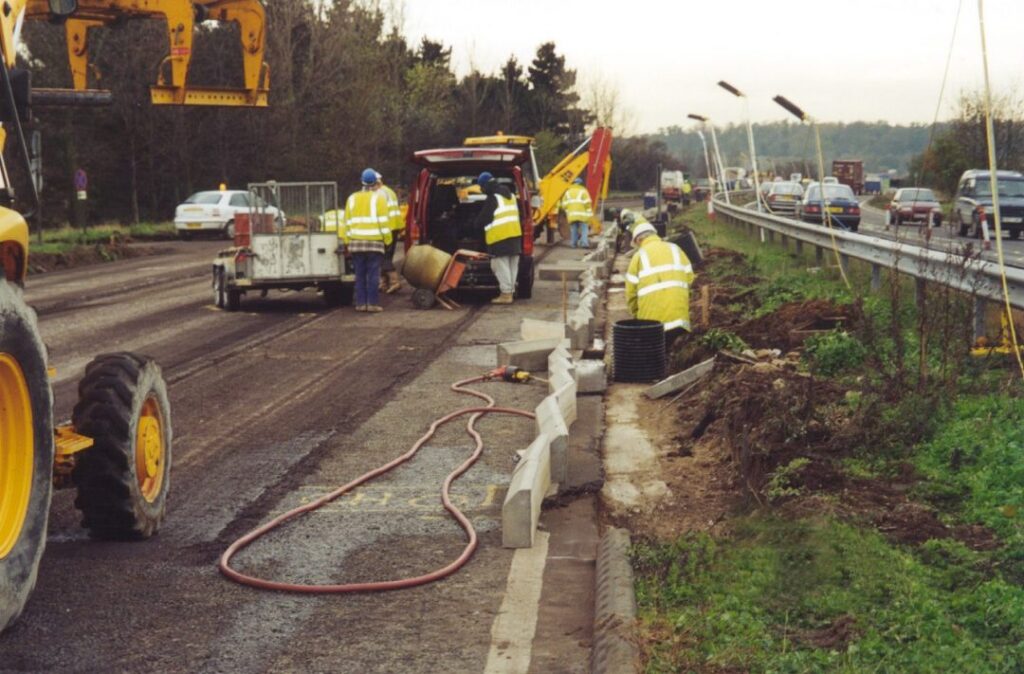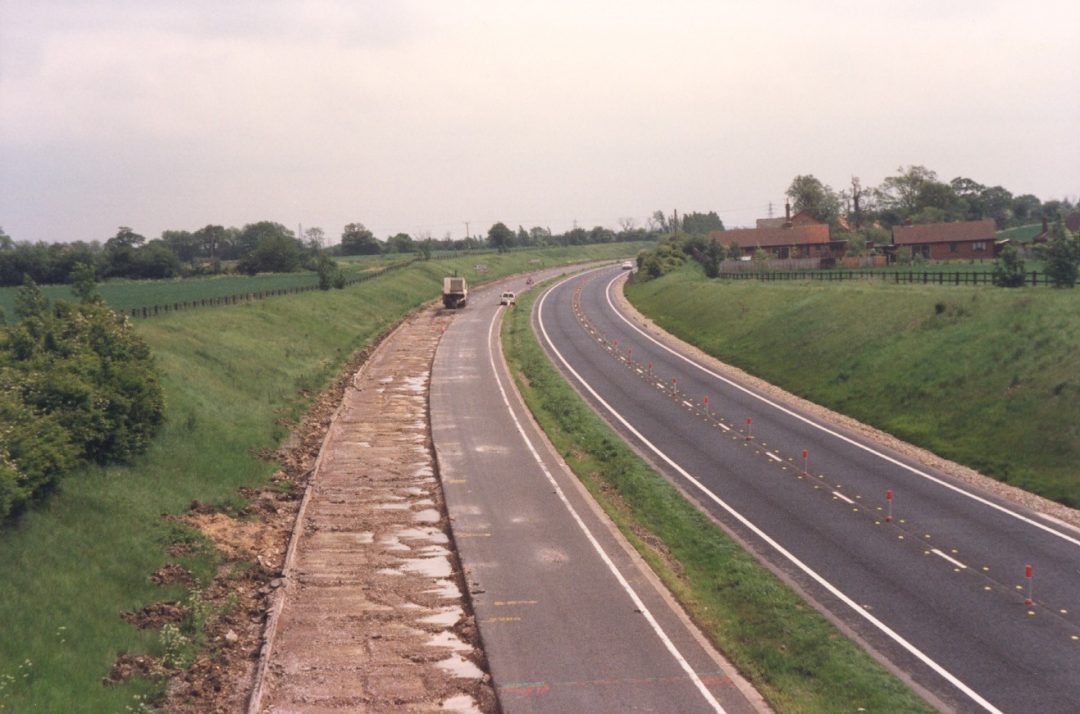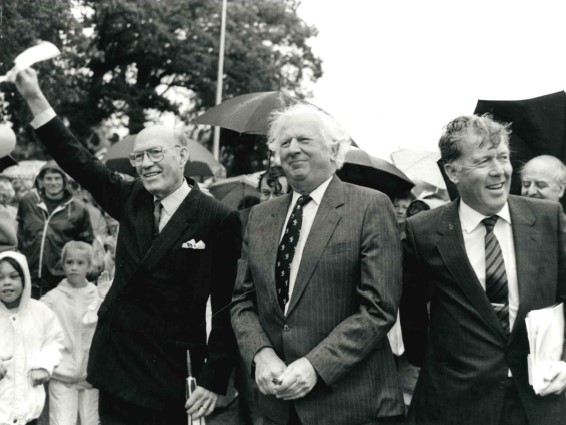
Breheny Heritage
Breheny in the 1960’s – Memories of Mick Tyler
I joined Breheny Civil Engineering in the summer of 1964. I was driving a digger for a building firm on a new housing estate in Caister, Norfolk, newly married I was looking for a job with overtime as money was short and the builders did a flat week. The second phase of the roads and sewers were required and there was a Breheny sign at the entrance to the site to say that they were doing the construction work, I had never heard of them. Breheny turned up with a JCB 4C and a Ford Thames Trader tipper, dumper and 5 men. There were very few hydraulic excavators around and the 4C was the biggest wheeled one available. There was a big 4ft bucket for the rear, much bigger than any other wheeled digger and I had had 2yrs driving one prior to getting married, this was the only one I was aware of in North Norfolk at that time.
The next day a man in a suit and cap turned up and I was told it was Jack Breheny the owner. He was watching me dig a trench and I got off the machine, a Ferguson, and asked him if I could put my name down for a driving job with him. He asked me why and I said I wanted more hours and to get back on a JCB. He just asked me what I was earning and said “you will earn twice that with me, start a week Monday”. I was labouring the first week at Breheny and then he bought a nearly new JCB 4C off a sale at Hethel Aerodrome, now the home of Lotus Cars, it had been bought new by a firm that promptly went broke. Breheny operated out of a yard at Carlton Colville, near Oulton Broad and had 2 gangs, each with a JCB 4C that usually worked in the Lowestoft area, there was also a Yarmouth gang that did small jobs but didn’t have a digger permanently. The JCB 4C’s had a large flat roof probably 6ft x 6ft and a 12” high sign painted red was made with Breheny lettering , in white of course, filling each of the four sides 10’ high so people could see whose diggers they were from a distance. We kept hooks and chains, grease buckets engine oil cans and 5 gallon diesel cans on the roof. With the acquisition of the new digger this gang was increased to 6 of us and we never went to the yard but did all the Norfolk sites and the digger was always on site with a permanent dumper. We had a Bedford van driven by whoever lived furthest from the site and had a driving licence. He then picked the others up on the way in next day to be on site at 07.30am. All the plant was owned by the company and nothing was hired. We had a big cement mixer, it was loaded one end with aggregate by an electric shovel on a wire rope that the operator walked with and the cement went in this end with the water and the concrete was discharged the other end. Everything apart from the JCB 4C’s was painted Breheny red. Site sheds were made by a carpenter in the yard and transported in sections to the site on the tippers. The cement was all 112lb bags in those days and we used a lot of them!
There was a building boom and numerous housing estates were being constructed and Breheny built the roads and sewers on all of them often working 7 days a week. The sites were located at: Winterton, Belton, Caister, Martham, Gorleston, Poringland, Stalham, Hemsby, Thurlton, and Bradwell, some of the sites having hundreds of properties being built on them. All the sewer and storm water pipes were salt glazed in those days which meant they’re very heavy and the larger ones were lifted into the trenches by the JCB 4C that was digging the trench. This is where the 4 foot bucket came in as quite often some of the runs worked so that the storm water and sewage drains could be put side by side in the same trench. The joints were made by a tar rope pushed into the socket and then men making a sand/cement joint, working on their knees at the bottom of a wet cold trench, not so good and they were long runs of pipes. The JCB 4C’s would only dig to 12 foot depth and we had a 14 foot deep run at Gorleston. I dug out a 4 foot deep roadway first, wide enough for the digger and then put the machine in this to dig the trench. It was pure sand so we didn’t shutter but battered the sides so that they wouldn’t fall in. So much spoil was coming out another 4C had to take the spoil from me and put it further away so we had room to work, luckily it was just a bare field anyway.
I remember Jack saying that when he arrived in England he got off the train in London and was penniless. He was a bricklayer by trade and I believe ended up in Great Yarmouth working on the new power station, it took 100,000 bricks to build the chimney. There was a civil engineering firm in Oulton Broad called Harper and he ended up working for them and fell in love with and married the daughter of Mr. Harper. Jack then started his new business. Some of his workforce had come with him from Harpers, one was called Eric Ellis a surveyor who set out all the roads and pipelines on the new housing estates. Jack was a straight man and I got on well with him. He treated you well if you were a good worker but got rid of anyone who didn’t pull their weight. I remember working on the site opposite where the James Paget hospital is in Gorleston and digging through a water main that no one knew was there. In those days it was very much hit and miss with services, if they weren’t shown on the plans we inevitably found them when the digger bucket went through them. Everyone was dressed the same in those days and there were no such things as uniforms. Four water board employers came to mend the water main and were standing around waiting for a lorry to bring the replacement pipe. It was a Thursday and Jack turned up with the wages, got out of his car and promptly sacked the water men for not working, and they didn’t even work for him!! He looked a bit bashful and apologised when I told him who they were.
He nearly went broke on one of his first jobs. It was a bypass on the A12, I can’t remember which one as I didn’t work on it, but apparently he had priced it too cheaply. They hit a clay that swelled when wet. The whole area had to be excavated to a greater depth and sandy fill added to bring it back to the right level using hundreds of thousands of tons of fill. Jack got the fill very cheaply from a local quarry and sold it at a good price to the ministry and so the business survived. The JCB 4C’s stood him in good stead working flat out almost every day and they never broke down. The drivers greased them every day, there were no sealed bearings in those days and we used to change the air and engine oil filters ourselves when due for renewal. There was a self-employed mechanic in Carlton Colville who did any repairs on the plant, his name was Jimmy Cross and he changed the hydraulic oil filters.
Jack bought Brampton Rectory and we, the Yarmouth gang, went there and landscaped the garden and put the drive in. Mrs Breheny was very good with the cakes and teapot and Jack was a different man at home, very relaxed and insisted on showing us how to grow potatoes from peel with an eye attached, a legacy of his ancestors in Ireland who probably went through the Irish potato famine I would think.
About that time we dug out all the roads for what is now called Africa Alive, it was just farmland then. They wanted a road constructed of brick demolition hardcore topped off with hogging. An uneven sized sub base is no good as it moves under traffic and of course the larger bricks protruded through the surface. Jack turned up and the owners complained about the surface of the road, he said to them, ’you specified demolition hardcore what do you expect the ******* M1? That was the end of conversation! We used crushed concrete as a sub base in those days as they were taking up the WW2 runways at various old airfields in East Anglia at the time, so there was a plentiful supply. We did a lot of demolition especially in Lowestoft, no health and safety in those days. I would put the front bucket on the brickwork of a bed room window on a two storey property and then put the digger in reverse gear and lift. As soon as the building started to crumble I shot backwards and just repeated the process until the top storey collapsed and then the rest of the ground floor demolition was easy. We took down over 50 terraced houses’ a mortuary, chapel and the pub in Lowestoft.
We used a lot of concrete manhole rings and concrete covers for the sewers on the estates and these were made in the yard and lifted into position with a set of 3 hooks on chains on the rear buckets of the 4C’s. A tipper used to go to Beckenham in Kent periodically for a full load of cast iron road manhole covers. The digger drivers were looked after very well, on a par with the foremen and I remember one winter the frosts were so bad work virtually stopped and all the labourers, kerb layers were laid off for a few weeks but the foremen and digger drivers stayed on full pay. Norfolk winters were very cold in the 60’s.
At Christmas the foremen and digger drivers got a large Turkey from Jack Breheny and the tipper drivers usually dropped them off on Christmas Eve and I remember one Christmas I was missed out for some reason. I went home on Christmas Eve empty handed, we finished at lunchtime, and wondered if we could get a bird from somewhere and more importantly if we had enough money for one. About an hour later Jack’s car came into our road and he lurched up the path, passed me the box over the gate and said, “here’s your ******* turkey I forgot it, Happy Christmas” and shot off at high speed. He had driven over 10 miles to bring it to me.
After I had been there about three years, 3 brand new Ford tippers turned up along with a 10 ton road roller and a small bulldozer and secondhand Leyland low loader. Jack also bought a local quarry at Hulver near Beccles. Around this time we started doing jobs for East Anglian Water and we put in a new water main from Halesworth water tower to Pakefield water tower. If I remember correctly this was over 19 miles the route that we took. We, the Yarmouth gang, did the length down the A12 to Kessingland in the road, alongside some important undersea telephone cables at times and there was no sensing equipment in those days. We had to dig and find them at intervals to plot where the trench was going. There was 15’ of asphalt for a long length and another compressor was hired in that supplied air to 4 men and jackhammers as there were no breakers on diggers in those days. There were 6 hammers working in front of me to get the road surface cut out for the digger. We had two tippers every morning to take the first spoil away and then used a dumper to tip the spoil onto the pipes that were laid behind us. I think they were 9” plastic with 6” sandy fill around them before the spoil was put back. One morning we didn’t get the lorries and couldn’t start digging there were no phones in those days. Our foreman was ill so I was in charge of the gang and we were standing around on the A12 when Jacks car appeared. He saw that there was nothing happening and pulled up with a face like thunder. I knew someone would get sacked so I ran to the car pulled the door open and said to him, “why haven’t you organised the tippers we can’t start work without them”, he screeched off towards the yard and sacked the yardman for not sending the tippers. Then we went to Halesworth and started from there and a Lowestoft gang started at Kessingland where we had finished and we eventually met halfway.
We often worked the housing estates during the week and did demolition at the weekend and it was very busy. Jack had run the firm until then but now more management was employed. A chap called Mr. Beaumont had a big say but he was really an accountant and knew nothing practical but was always trying to save money, at the expense of overtime etc. Nevertheless he managed to set himself up with a brand new sports car as company transport! Then Jack’s brother Tom joined as plant manager, he had been working on construction sites in South Africa. He was always cutting down on equipment purchases to justify his job and if you asked for a new grease bucket it was as if you had requested a new digger. There were no rules and regulations at all and we did the job in the way we considered to be the most efficient but it certainly wasn’t the safest but luckily no one got hurt. The company bought a Poclain 360 wheeled digger with a greater digging depth and this started a big new site in Oulton Broad. There was a big personality clash between Tom Breheny and myself and the company didn’t seem the same any more, we never saw Jack to talk to. I reluctantly left but I look back on those years with happy memories, hard work but a good working atmosphere and Jack was a good man to work for.
Mick Tyler Summer 2021
